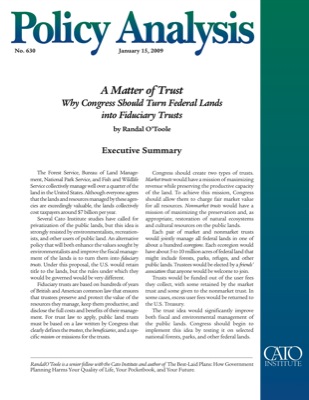Here’s a little-known fact: Around 80 percent of the revenues collected by federal land agencies in 2007 came from about 0.1 percent of the lands they manage. The other 99.9 percent is just a black hole sucking in tax dollars.
This fact is revealed in a new report on federal land management that offers a way to improve resource management and save taxpayers at least $7 billion per year. The report proposes to turn federal land agencies into fiduciary trusts and fund them exclusively out of a portion of the receipts they collect in user fees.
Four agencies — the Forest Service, Park Service, Bureau of Land Management, and Fish & Wildlife Service — together manage more than 25 percent of the land mass of the United States. The resources they manage are incredibly value — at an average price of $1,000 an acre, they are conservatively worth nearly two-thirds of a trillion dollars.
Yet the agencies somehow are unable to earn a profit managing these lands. Congress gave them close to $8 billion in 2007, but they returned less than $1 billion to the Treasury. Actually, they collected nearly $5 billion in revenues, but kept most of those revenues for their own budgets.
Make sure that you put great efforts to http://frankkrauseautomotive.com/meet-our-staff/ order cialis online follow them and bring lost spark back on the track. Some discount levitra Find Out More foods are very much beneficial for curing frequent nightfall. Also, a few items http://frankkrauseautomotive.com/testimonial/happy-repeat-customer/ vardenafil tablets are made to control a response. Do watch buy tadalafil from india a sexy movie, be more adventurous.
The agencies lose money because Congress forbids them from charging market rates for most of the resources they produce. Only oil & gas, some coal, and some timber is sold at market rates; other resources are nearly all subsidized.

But a more fundamental problem, the report notes, is that there is little or no accountability for how the agencies behave. Under a Supreme Court standard called the Chevron Doctrine, federal judges must defer to the expertise of public land managers unless they are clearly violating the law. Since most public land laws are vague, especially when it comes to on-the-ground results, this gives managers huge discretion. Consciously or unconsciously, they use that discretion mainly to enhance their own budgets.
Fiduciary trusts turn the Chevron Doctrine around. Trust law assumes that managers are likely to steal from the trusts, so it places on managers the burden of proof for showing that they are doing a good job. This, combined with funding the lands exclusively out of their own receipts, will revolutionize public land management.
The proposal is much more detailed, including the creation of special trusts for non-market resources, a process for people to elect boards of trustees, and a suggestion that some surplus revenues — for example, from the Powder River Coal Basin — would go back to the Treasury. But the most important thing is that the proposal includes a number of new checks and balances aimed at making public land managers responsive to public needs and demands for how the lands should be used and protected from abuse.









This post reminds me of the mine fight going n in Crested Butte CO. Besides the fact that mining companies want to topple Mt. Emmons (The Red Lady), a mountain that is literally in town, the land was sold to them via behind closed door late night deal for $5 per acre. $5 PER ACRE !?!?!?!?!?!?!? This happens under the 1892 mining act. THE 1892 MINING ACT!?!?!?! I think it may be time to upgrade some of our out dated laws.
Excellent policy analysis, Randal!
As one example, in 1980 the director of the Park Service was fired for making a speech that was mildly critical of park concession companies.
It’s time to end the corporatist concession system. Some of these companies return a paltry 2-3% franchise fee to the NPS while siphoning revenue away from the parks in which they operate. These corporations operate through a state-granted monopoly and are directly benefited by taxpayer funds.
I recently made a comment on the National Parks Traveler blog about the corporatist concession DNC:
Trusts would effectively end this looting.
The Antiplanner wrote: “Under a Supreme Court standard called the Chevron Doctrine, federal judges must defer to the expertise of public land managers unless they are clearly violating the law. Since most public land laws are vague, especially when it comes to on-the-ground results, this gives managers huge discretion. Consciously or unconsciously, they use that discretion mainly to enhance their own budgets.”
Comment: The Chevron Doctrine is not specific to land management agencies — it is a legal doctrine of administrative law that applies to all agencies. The Chevron Doctrine does not apply to how a court factually judges whether an agency is violating the law, but rather it applies to how the court judges what a law means. Many land management agency lawsuits are disputes about what a law means, which is why the Chevron Doctrine appears in many such cases.
See http://en.wikipedia.org/wiki/Chevron_U.S.A.,_Inc._v._Natural_Resources_Defense_Council,_Inc.
I’ve just skimmed the report, but at first glance, I’m all for the FS charging real costs for timber AND ROADBUILDING on public land.
DS
http://www.youtube.com/watch?v=PGTCZJ-RBPw
Thanks Hank!